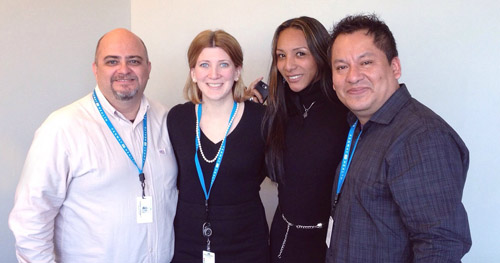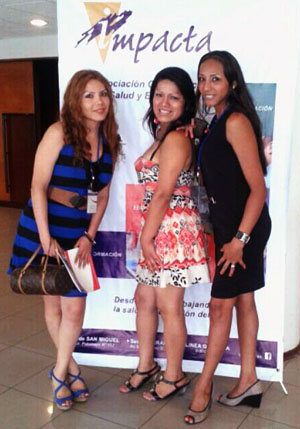Posted by Lucile Scott, June 2, 2015

Leyla (second from right) during a visit to the Fenway Institute in Boston.
Last December, as part of the GMT Initiative’s new Implementation Science program, amfAR awarded a three-year grant to a Peruvian study researching how integrating “gender-affirmative” medical services, including cross-sex hormone therapy, with HIV care will impact access to HIV testing and support services among all transgender women and adherence to antiretroviral therapy among those living with HIV. The project is a collaboration between two non-governmental organizations based in Lima, IMPACTA and EPICENTRO, and the Boston (U.S.A.)-based Fenway Institute.
Around the world, transgender women often face violence and discrimination that deter them from seeking HIV and other health services, and the researchers hope the study will provide a model for improving the population’s access to appropriate, discrimination-free care worldwide. To find out how the study’s going so far, the GMT Initiative checked in with IMPACTA’s Leyla Castillo, a longtime transgender advocate and the study coordinator.
amfAR: How do you hope this study will impact transgender women in Peru?
Leyla: Currently, most trans women in Peru and throughout Latin American do not have access to quality health or gender-affirming services, and because of that there is a lot of death going on and a lot of disfigurement caused by women self-injecting hormones and oils that can be very dangerous if they are not used correctly.
 Leyla (far right) and other Peruvian trans advocates pose in front of an IMPACTA poster. In the past, HIV work in Peru has focused on men who have sex with men (MSM), not trans women, and we are just grouped in with them. This leads people to believe that we do not face different issues than MSM. It also means there is very little data about trans women. There has never been a national study about our HIV rate, but one study done with a very small sample size showed that the rate is 30%. Most trans women in Peru do not ask themselves the question, ‘will I get HIV,’ but ‘when.’
Leyla (far right) and other Peruvian trans advocates pose in front of an IMPACTA poster. In the past, HIV work in Peru has focused on men who have sex with men (MSM), not trans women, and we are just grouped in with them. This leads people to believe that we do not face different issues than MSM. It also means there is very little data about trans women. There has never been a national study about our HIV rate, but one study done with a very small sample size showed that the rate is 30%. Most trans women in Peru do not ask themselves the question, ‘will I get HIV,’ but ‘when.’
The legal framework doesn’t even acknowledge our existence, and this increases the discrimination we experience in healthcare settings. For example, we are often called by our legal name in a crowded doctor’s office. This attitude ridicules you and makes you feel worthless because people look at you and snicker, causing you not to want to go back.
We need this study so we can really prove that the lack of sensitivity among healthcare workers is fueling our lack of access to HIV testing and care. We also need the health center for trans women that we are opening for the study where we can access care created for just us.
amfAR: How is the study going so far?
Leyla: Great. I am a member of a study working group of eight trans women who are all leaders in the community, and we have been, and will continue to be, involved and consulted during every step of the study. Past studies among trans women in Peru have not worked out like we hoped because we were not involved, and we know best what is going on with trans women. In the end, the researchers left with their data, but health services didn’t change and stigma and discrimination were still being experienced in health centers.
This involvement will also increase the number of trans women who will be able to do this work in the future. I have been in this field for many years, and in the past, I have only worked with two other trans women who have the professional capacity to do this work.
Currently, the working group is holding focus groups with trans women to better understand barriers that prevent them from accessing care and their health priorities, and to increase awareness about the study among the community. We plan to start providing trans-specific services this summer. The women are all very excited about the study and having a center just for trans women, and we’ve learned many interesting things.
amfAR: What motivates you to do this work?
Leyla: Instead of giving my community something just for today, I am helping to capacitate them for the long term. I am very certain this study will create tools for trans women in Peru and offer trans-specific healthcare that responds to the issues we are seeing with retaining them in HIV care for the first time. Also, there is not much data about this anywhere, and I hope that the study will establish a model for trans programming that can be used in other parts of the world.